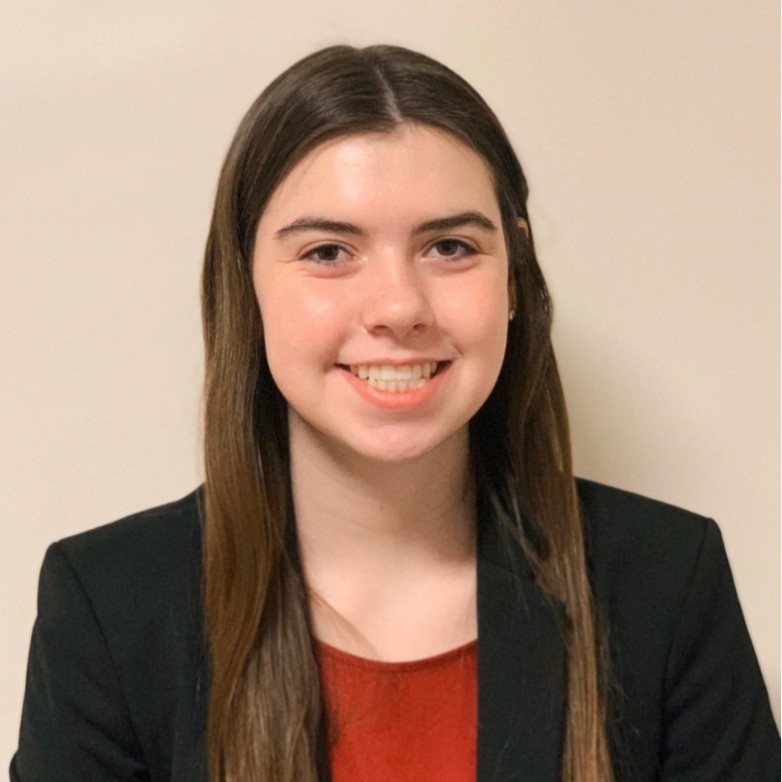A Career Change Cover Letter is a document written by a job seeker with a nontraditional background for the job type they are applying for.
The job seeker uses the cover letter to highlight and explain why their work history, professional skills, and personal interests can be valuable in a different industry.
A job seeker’s resume may not contain relevant experiences that can compel a hiring manager to consider them for a position that the job seeker may not have any experience in. The cover letter tailors the job seeker’s experiences, strengths, and transferable skills to the new job. It helps to illustrate how the job seeker’s skills and background can be applied in a different career field.
Therefore, the job seeker must ensure that they have conducted adequate research on the industry they would like to transition to and understand the goals of the career that they are looking to transition to. This will enable them to create a clearly defined goal for the position they are applying for. A well-crafted cover letter will help convince the hiring manager that you are the best candidate for the role.
Free Templates
Following are some free templates provided for you:
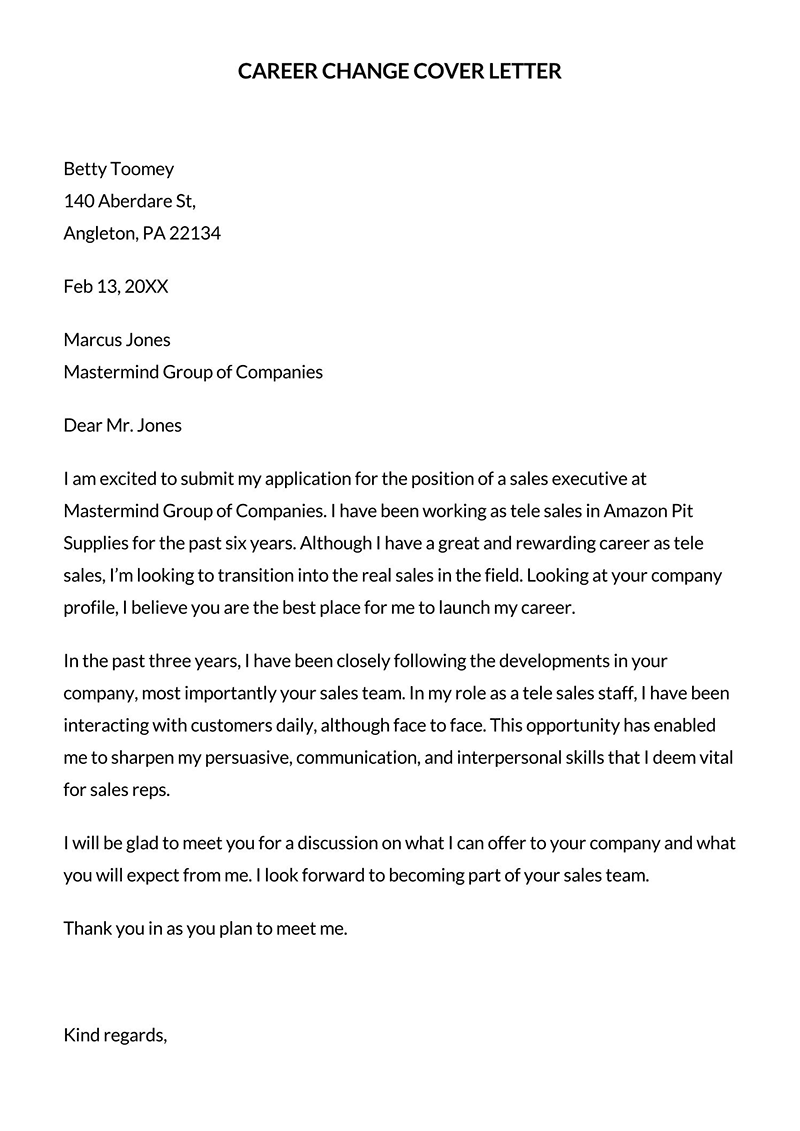
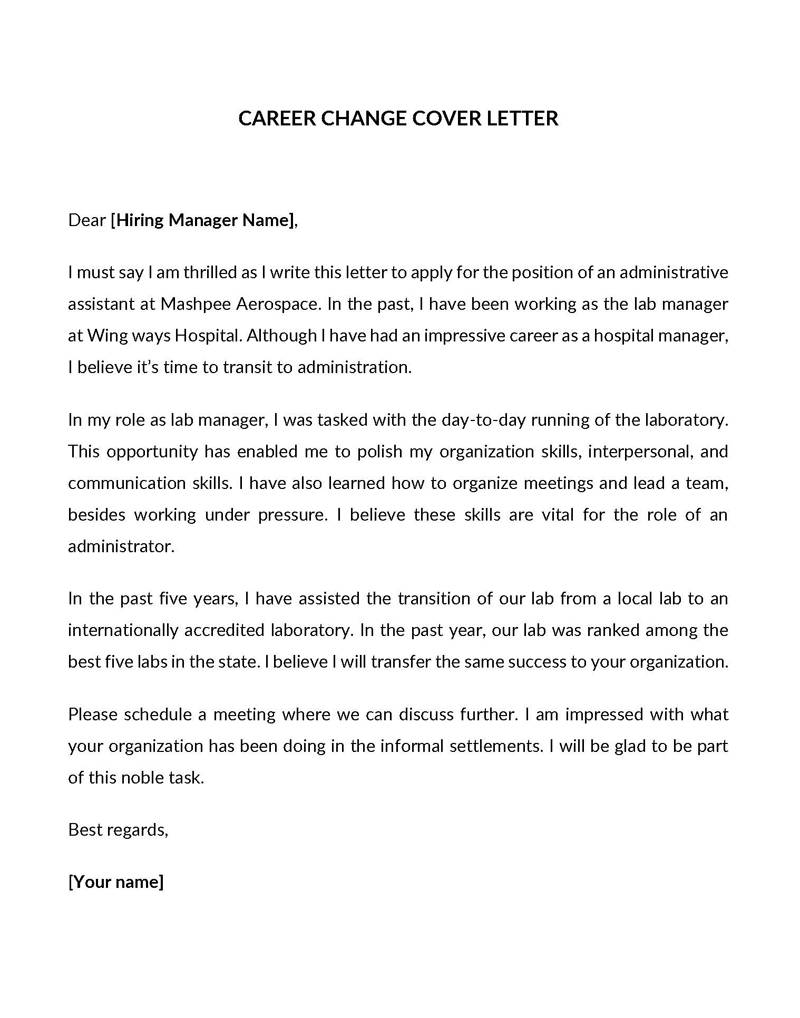
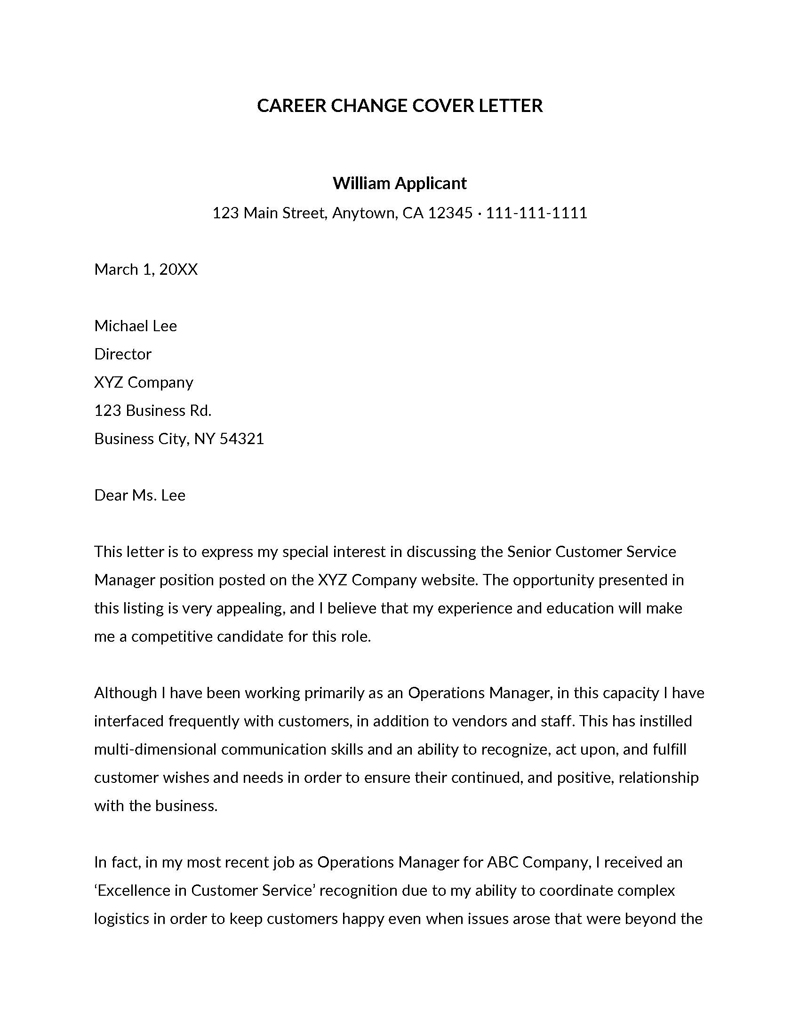
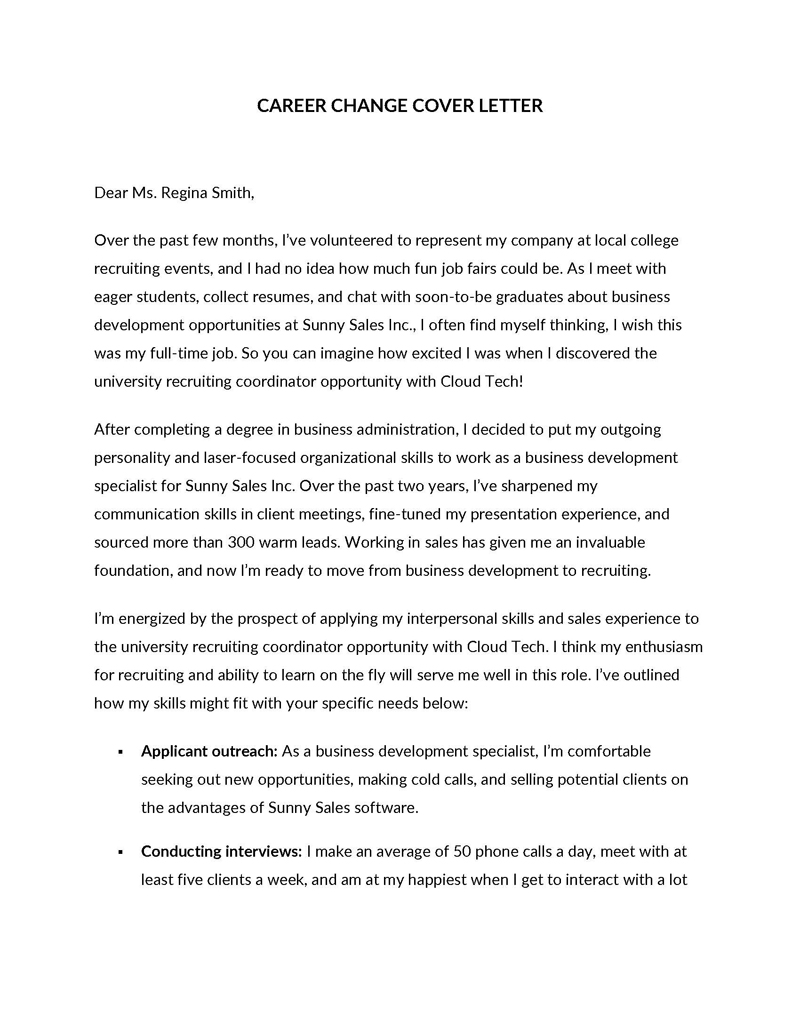
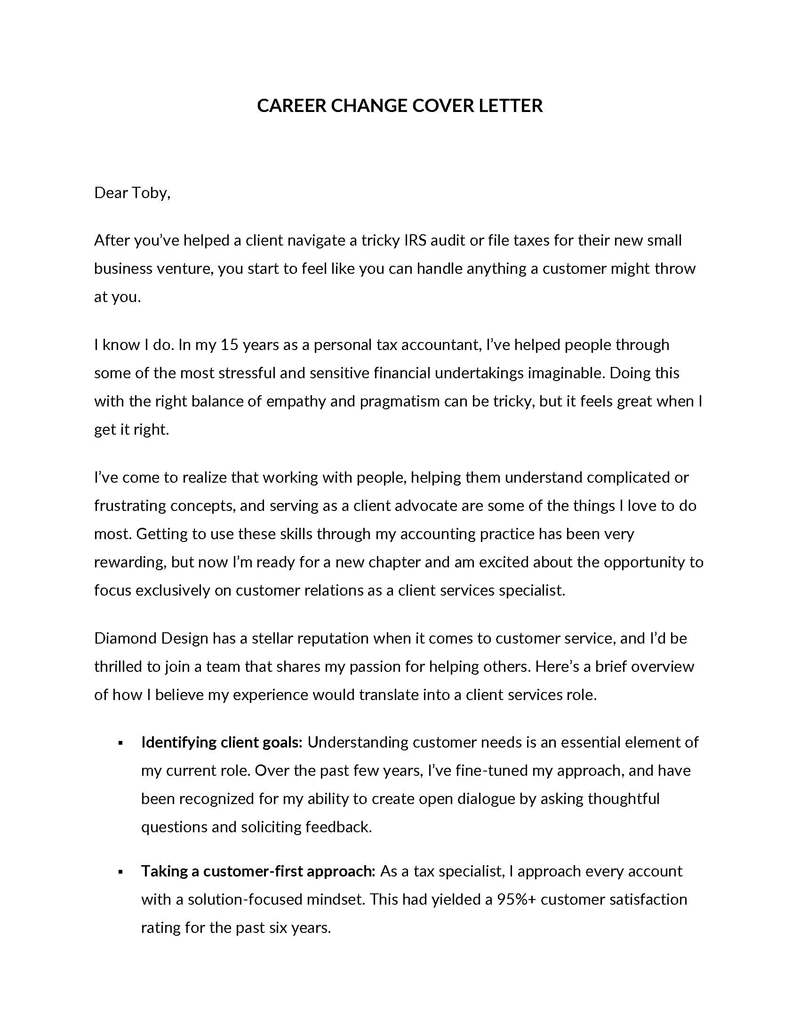
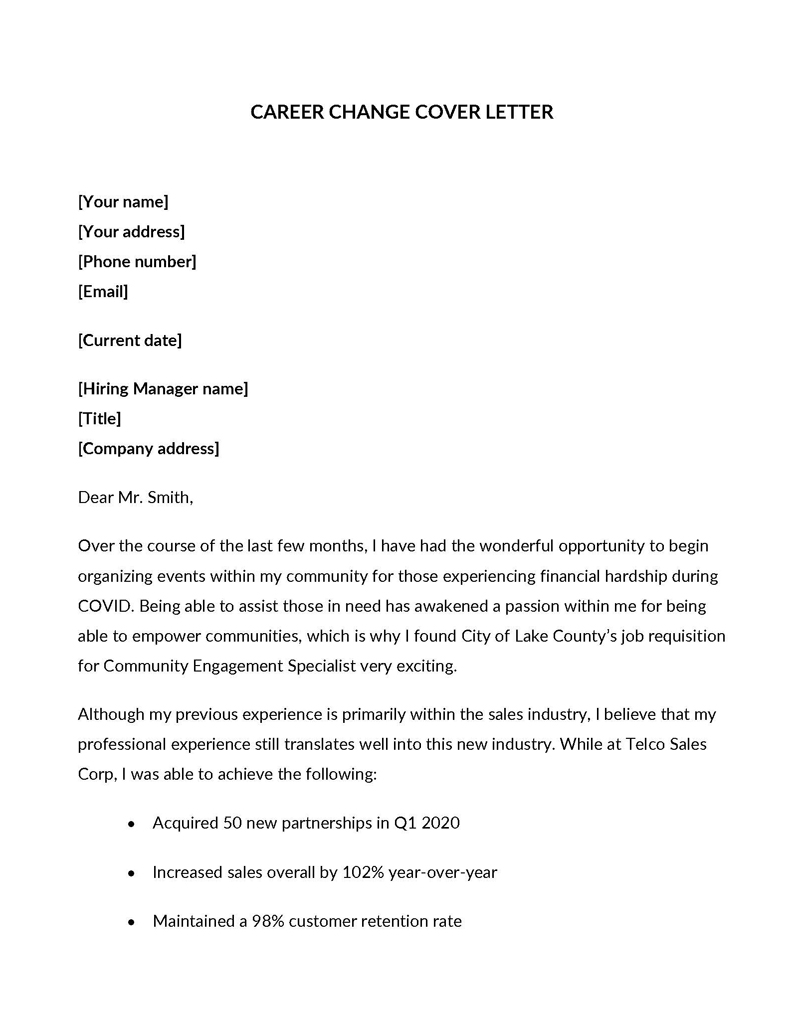
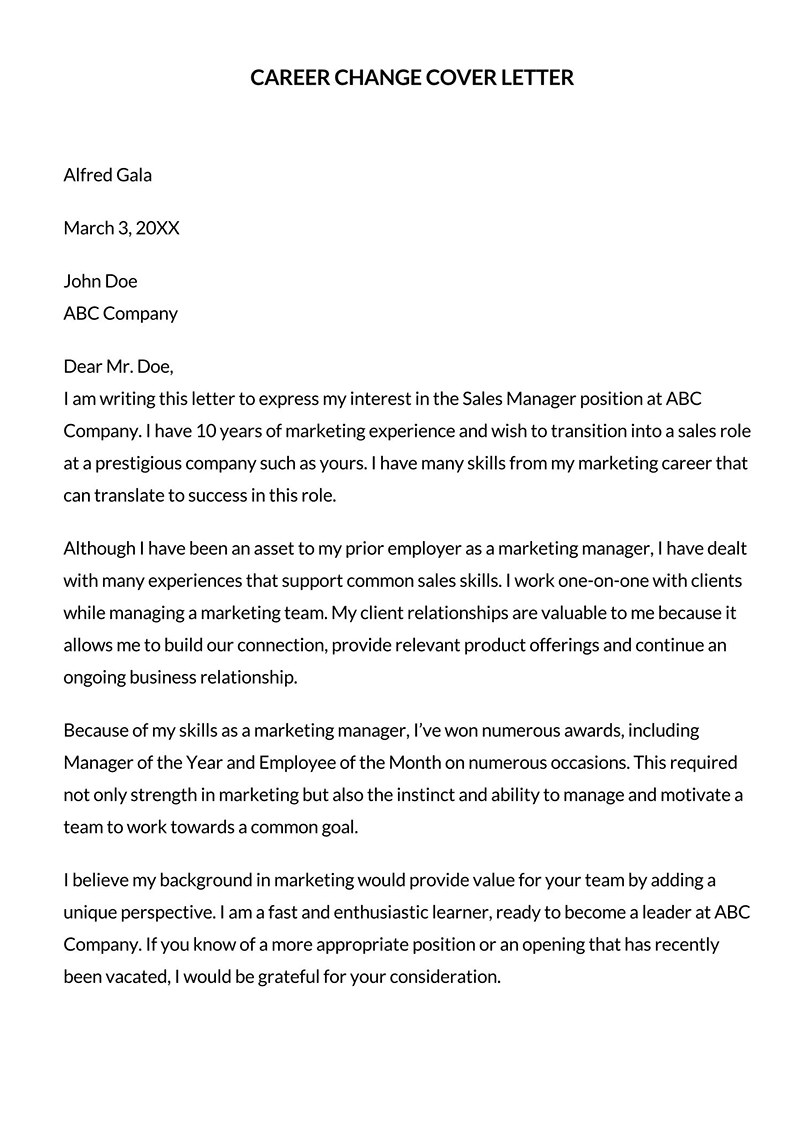
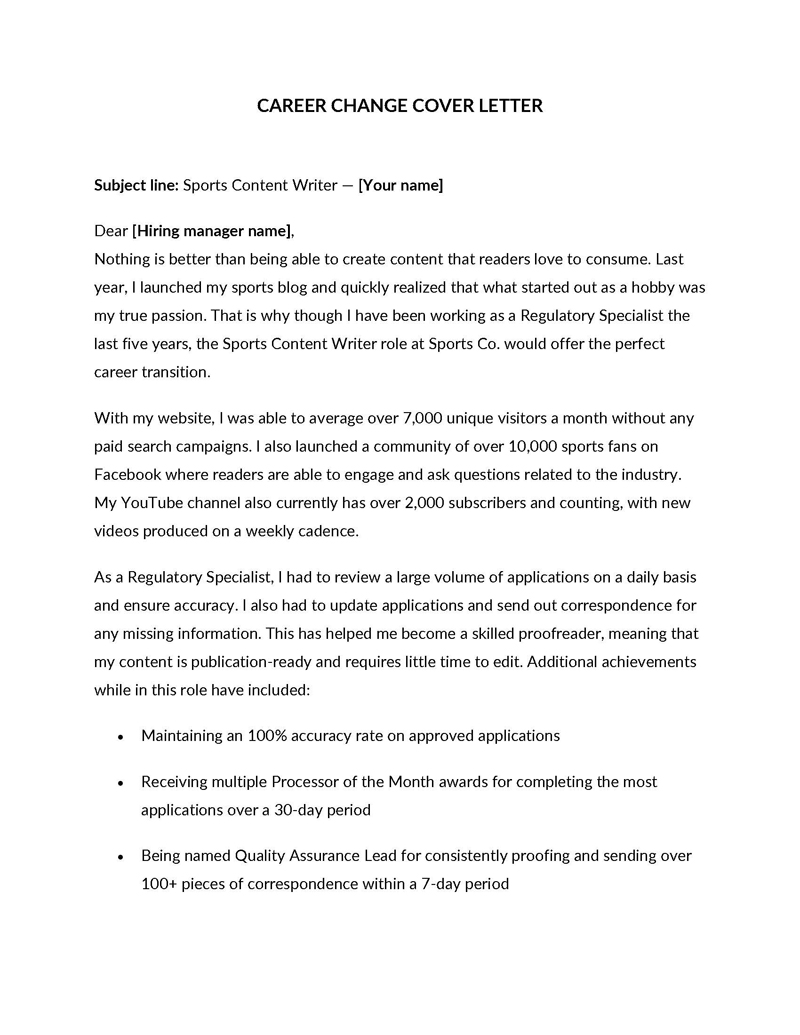
How to Write the Cover Letter
A well-written cover letter should enable the job seeker to craft a clear and convincing narrative that explains why they are the right fit for the job.
The job seeker must ensure it contains the following structural features:
Header
The header of the letter is the first thing the employer sees. It should therefore be well written to provide the letter a professional look. The information contained in the header should be provided in a physical copy of the cover letter.
The header plays an important role in conveying contextual information, which includes the following:
Your personal information
The job seeker should start the header by providing their personal information. This information should include their name, address, and contact information. This helps the employer identify the job seeker by name, enables them to contact the job seeker, and helps in informing them of their application status.
Date
The job seeker should follow up by providing the date of writing on the header. The date gives the employer an indication of when the letter was written. It also helps the employer relate better to the contents of the letter.
Hiring managers details
The header should be concluded with the hiring manager’s details. The details provided should include the hiring manager’s name, title, company name, and address. This helps provide clarity as to whom the job seeker is writing to.
note
The job seeker should start by confirming the appropriate mode of delivery for their application. If the employer specifies that the cover letter should be sent via email, the job seeker should confirm if the cover letter should be sent as an email attachment or within the body of the email.
The job seeker should ensure that an email cover letter contains a subject line stating their name and the job title/role they are applying for. The job seeker’s contact information should appear at the email signature.
Suppose no specifications have been provided in the job posting; the job seeker can put the salutations and then paste the rest of the cover letter onto the email without including the contact information present in a physical /standard cover letter.
Greeting/salutation
The cover letter should also contain a greeting /salutation that specifies the hiring manager’s name. Addressing a hiring manager directly can demonstrate a job seeker’s seriousness. However, if the job seeker cannot find the hiring manager’s name, they can address the letter to ‘Dear Hiring Manager.’
Opening paragraph
The opening paragraph of a cover letter is important because it hooks the hiring manager into reading it. The information contained in the opening paragraph should be simple and straightforward.
It should therefore contain the following information:
Introduce yourself
The opening paragraph of the letter should state who the job seeker is, what they do and why they are the right person for the job. A job seeker can also include where they saw the vacancy posting. If another person referred the job, they should mention them by name to help personalize the cover letter and show how they already have contacts in the industry.
Express your excitement
The job seeker should also ensure that the opening paragraph expresses their genuine excitement and interest in the position. The job seeker can even express their willingness to start in an entry-level position and work their way up the company. This shows a willingness to learn about the industry.
Mentioning the company’s mission, values, or products that the job seeker admires can help show the hiring manager that they have researched the organization. In addition, the job seeker can use this to point out that they are the right candidate for the position.
Body paragraph(s)
The body of the cover letter details the job seeker’s qualifications and skills. It contains persuasive information intended to convince the hiring manager that the job seeker is the best candidate for the position.
It should contain the following information:
Give reason for the change in career
The hiring manager/employer will be interested in knowing why a job seeker with unconventional qualifications is applying for the position. It is, therefore, important that the job seeker is upfront by starting the body of the cover letter by explaining why they are making the transition. This enables the hiring manager to understand the candidate. The job seeker should aim to keep the explanation positive as there is no wrong or right answer.
Emphasize your transferable soft skills
The job seeker should then ensure that they emphasize their transferable soft skills. Transferable soft skills are technical skills that can be applied to a job regardless of one’s title or work industry. The job seeker should link the skills they have acquired in one industry to the industry they hope to transfer to. This will help the employer envision the contribution the job seeker can make to the company.
The job seeker can use bullet points containing three to five primary skills related to the position to help organize the information. The job seeker can also use specific examples from their career history of soft skills gained, where possible.
Examples of transferable skills that you should consider adding to your letter to increase your chances of being selected for the position you are applying for include:
EXAMPLE
- Leadership
- Work Ethic
- Critical thinking
- Communication
- Creativity
- Conflict resolution
Mention your easily measurable hard skills
The cover letter should also contain a job seeker’s measurable hard skills such as certificates or computer programs that they are well trained in. This helps to show the employer the extensive skills contained by the job seeker that they can tap into when the need arises.
EXAMPLE
If the job seeker is proficient in analytics, the employer can use this help to examine problems in an all-rounded manner and break down possible existing solutions.
Highlight your superior performance in previous positions
The job seeker should also mention tangible achievements from the position previously occupied. This helps the job-seeker stand out from other candidates that may be mentioning achievements made in a similar role. It also helps the employer visualize possible accomplishments that the candidate can make.
Express your passion for the company and job
A job seeker should end the body of the letter by expressing their passion for the job and the company. The job seeker can do this by first proving what he knows about the job/company. The information can be obtained by researching core values important to the company, which the job seeker should align with their own. The company’s website, LinkedIn, or checking the profiles of company employees that occupy a similar role can help inform the job seeker’s research.
Closing
The closing of the cover letter is a job seeker’s last chance to impress the hiring manager.
It provides the job seeker with an opportunity to make a lasting impact on the hiring manager by providing the following information:
Write a strong closing argument
The cover letter should contain a strong closing argument of what the job seeker believes they can do for the company. This will help the job seeker highlight that the company can gain an asset by hiring them.
Provide references
The job seeker should also provide references who can verify the information provided in the letter. It will be advantageous to provide a reference that is a mutual contact with the company the job seeker is applying for. Such a reference is likely to be trusted more than an unrelated reference to the company or industry.
Thank the hiring manager
Finally, the job seeker should thank the hiring manager for their time and consideration. This shows adherence to proper business etiquette. It also helps show that the job seeker is aware that the hiring manager is considering other candidates.
Sign-off and signature
The job seeker should sign off with an appropriate word or phrase such as sincerely, regards, yours truly, etc. The sign-off should be followed by the job seeker’s signature. The sign-off and signature help demonstrate attention to detail, especially in adhering to the appropriate business format.
Tips for Writing a Good Cover Letter
A job seeker changing their career can be deemed a risk to employ by a hiring manager. This makes it essential to write a good cover letter.
The job seeker can consider the following tips to ensure that their letter persuades the hiring manager:
Do your research
A job seeker writing the cover letter should ensure that they have conducted adequate research on the company they are interested in joining. This helps the job seeker prove that they understand the company. It also helps the job seeker explain their interest in the position.
Write a captivating opening
Writing a captivating opening can grab the hiring manager’s attention and hook them into reading the rest of the letter. The opening paragraph should tell the job seeker’s story. However, the opening must be related to the position the job seeker is applying for. A captivating opening can contain relevant experience related to the position. The experience should demonstrate honest enthusiasm for the position and the company from the onset.
Emphasis on your strengths
When writing the letter, you should focus on the skills you’ll transfer to this new role rather than what was relevant in your previous position. Amylase the requirements of the new job and tailor your cover letter to these specific demands and any achievements that will support your skills.
Enumerate your achievements
In your letter, it’s vital to highlight measurable achievements in your past role. It portrays your work ethic and dependability. If you have achieved incredible results in your previous assignments, there is a high probability that you will transfer the same result to the new job.
Express a strong liking for the company
Besides skills and other relevant qualifications, hiring managers are also interested in individuals who are passionate about the company. Throughout your letter, you must demonstrate that you know what the company does and how you will help them to achieve their goals.
Cover Letter Samples
Following are some samples provided here for you:
Sample Letter 1
Dear Mr. Jones
I am excited to submit my application for the position of sales executive at Mastermind Group of Companies. I have been working as a telesalesman in Amazon Pit Supplies for the past six years. Although I have a great and rewarding career in telesales, I’m looking to transition into real sales in the field. Looking at your company profile, I believe you are the best place for me to launch my career.
In the past three years, I have been closely following the developments in your company, most importantly your sales team. In my role as a telesales staff, I have been interacting with customers daily, although face to face. This opportunity has enabled me to sharpen my persuasive, communication, and interpersonal skills that I deem vital for sales reps.
I will be glad to meet you for a discussion on what I can offer to your company and what you will expect from me. I look forward to becoming part of your sales team.
Thank you as you plan to meet me.
Kind regards,
Betty Toomey
Enclosure: Resume
Sample Letter 2
Dear Mrs. Baker,
It is with great enthusiasm that I express my interest in the position of Marketing Manager as advertised on the XYZ company website. I have been a sales agent at Wellington company for the last five years. This has been a rewarding career; however, I hope to transition into a career in marketing to expand my skill set. I believe that the experience that I have acquired can transfer over to the marketing field.
My work as a sales agent has provided me with vital marketing experience; for example, my current job requires me to work with a sales team to help track performance indicators to my work.
I have been awarded Salesperson of the year twice in the company. I have gained skills in commercial awareness, communication, and strong attention to detail. I believe that these skills, coupled with my strong background in sales, can be valuable to your company.
I look forward to hearing from you and discussing my application further. Thank you for your time and consideration.
Sincerely,
Peter Web [Peter Web’s signature]
Peter Web
email example
Subject: Career change cover letter
Dear [Hiring Manager Name],
I must say I am thrilled as I write this letter to apply for the position of administrative assistant at Mashpee Aerospace. In the past, I have been working as the lab manager at Wing ways Hospital. Although I have had an impressive career as a hospital manager, I believe it’s time to transit to administration.
In my role as lab manager, I was tasked with the day-to-day running of the laboratory. This opportunity has enabled me to polish my organization skills, interpersonal, and communication skills. I have also learned how to organize meetings and lead a team, besides working under pressure. I believe these skills are vital for the role of an administrator.
In the past five years, I have assisted the transition of our lab from a local lab to an internationally accredited laboratory. In the past year, our lab was ranked among the best five labs in the state. I believe I will transfer the same success to your organization.
Please schedule a meeting where we can discuss further. I am impressed with what your organization has been doing in the informal settlements. I will be glad to be part of this noble task.
Best regards,
[Your name]
Final Thoughts
Writing a career change cover letter can help you link your skills and qualifications to the unconventional job you are transitioning to. However, as the job seeker, you must ensure that the cover letter states and explains your transition to ensure that the hiring manager understands why you are making the change. Make sure to introduce yourself properly, provide valid reasons for your career change, emphasize your transferable skills, highlight your superior performance in previous positions and close the letter by writing a strong argument why you should be considered for the new role you are applying for.
